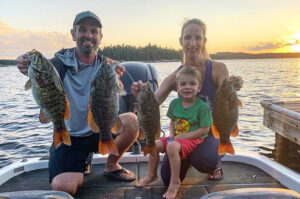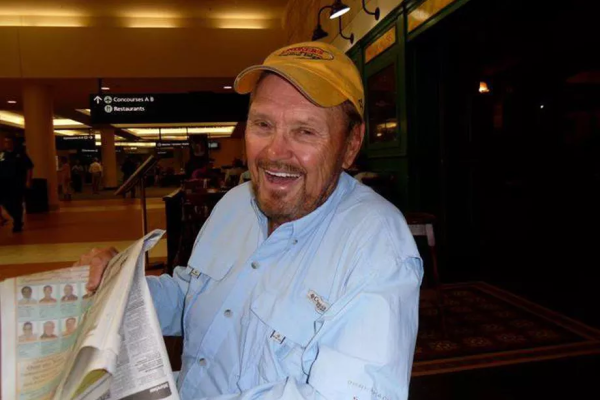Multispecies angler, Josh Peacock, shares what he has learned throughout the process of igniting the fishing flame in his kids

Take your family fishing
PARK FALLS, Wisc. (May 31, 2022) – Raised in Kenora, Ontario where the water from all one million acres of Lake of the Woods eventually flows into the Winnipeg River, Josh Peacock is a fisheries biologist, tournament bass angler, and a former full-time fishing guide. Like many other men his age, Josh is also a husband and a father.
Peacock comes from a long line of river rats. His four-year-old son, Brock, and two-year-old daughter, Eva, make it six generations of Peacock’s on the Winnipeg River dating back to the early 1900s. “The Winnipeg River is a special system with lots of fish, flora, fauna and an abundance of space to recreate,” says Peacock. He claims the river is in his blood. “Some days I swear I can feel it coursing through my veins. There have been days where I’ve felt such an intense connection with my surroundings that it has actually brought tears to my eyes. Not usually because of a fish, either; sometimes it’s just the way the water looks or the way the wind blows,” he states. “It can be a chance encounter with a normally secretive great blue heron that keeps following me around as we are on the same fishing pattern, or an osprey that suddenly appears overhead while I’m thinking about someone that isn’t with us anymore. Those are the connections I want my kids to have with Nature.”
Peacock says he never really thought much about how his family goes fishing together until recently. Seems his frequent family-fishing social media posts began to illicit a steady stream of messages and comments from inspired new parents, friends, and family members. “How do you get to spend so much time on the water?” they ask. “It must be nice!” they exclaim. “Got any tips for new parents wanting to get their kids out in the boat?” Peacock took pause.
“I guess I do!” was the answer he heard in his head. Peacock offers five “rules” for making the most of family-fishing fun on the water.
Rule # 1 – Start Them Young
Peacock advises parents to involve their kids in outdoors experiences as early as they are comfortable getting them out. “My parents had me in a boat at three weeks of age,” Peacock shares. “I truly believe that the gentle rock of a boat, the hum of an outboard, and the sound of water lapping against the boat not only calms newborns, but it alters their DNA in a positive way. Both our kids were born in the wintertime, but as soon as the ice melted, we made sure to get them out in their snow suits – all bundled up for their first ride on the river.”
Peacocks says he and his wife, Paula, have made the first boat ride of the year a family tradition. “Our kids have taken center stage in that tradition,” Peacock says. “We do lots of idling and sight-seeing, run the auto-chart live and make a few maps, maybe fish an hour or so tops – just to be able to say we caught our first bass of the season. These annual first rides get our kids reacquainted with wearing their sunglasses, lifejackets, sunscreen, and hats so it becomes second nature throughout the rest of the boating and fishing season. We make it fun and say things like, ‘don’t forget your fishing hat, or your special fishing glasses!’ We teach them good habits by wearing PFDs ourselves and always wearing the kill-switch tether. As you get older, you realize you are more than a role model to your kids. You are their super-heroes, and they are like sponges and parrots.”
Rule # 2 – Make it Fun, Keep it Fun
Peacock says you can’t fake true enthusiasm, and kids are excited when you’re excited. “I’m constantly astounded by what a child can pick up on,” he says. “I truly believe if you are positive, enthusiastic, and excited. They will be to. I love to go fishing and I love to catch fish, so my kids love those things, too.”
Peacock says keeping things fun starts with making sure kids are comfortable. “Pick a fair-weather day. Light winds, no rain, and sunshine but not heatstroke weather,” he offers. “Make sure they are dressed for the conditions and pack plenty of snacks. Not the ‘Tournament Lunch’ like a bag of trail mix and a Gatorade; I’m talking the whole nine yards. My wife, Paula, is the snack master. Kids love snacks, so spoil them a bit. Have them associate fishing with fun things, not just fishing, and certainly not just sitting there bored while mom or dad fish. A picnic in the boat with the Power-Poles down, or a nice shore lunch or beach spot to break up the day is always a good idea.”
When fishing, Peacock says to pick quantity over quality. “You and I would love to spend all day flipping for largemouth and getting six bites in eight hours for 20 pounds, but kids not so much,” Peacock advises. “Think action! Live bait and slip bobber setups are great for catching almost anything. A couple dozen live minnows are your best investment in making sure your kids have an unforgettable day. When fishing is slow kids, love to play with them, too.” Peacock extends the fun by setting a minnow trap and checking it regularly with his son. “Whether we catch eight minnows or five dozen, he loves it. We get some fresh air and exercise and extend our lessons about nature.”
Rule # 3 – Temper Your Expectations
Peacock says not to stay out too long and advises on planning for what happens when kids start to get restless. “We often bring two vehicles to the launch. I usually launch the boat ahead of time and have everything ready to go,” he says. “If your trip needs to be cut short for whatever reason – inclement weather, forgot diapers, maybe your ‘threenager’ is having a meltdown, etc. – one parent can cut bait while the other can deal with kid # 2, loading the boat, or maybe stay out on the water for a couple of extra hours to catch supper! Anytime on the water is better than none at all.”
He also says you shouldn’t expect to be fishing nonstop yourself. “You can fish on your own time. Focus your attention on helping your kids be successful,” he offers. “You will have successes and you will have failures, but if you remain focused on your kids, they’re going to have a good time, and that’s the win, not how many fish you catch.”
Rule # 4 – Have the Right Gear
“For early spring, we all wear our snowmachine or ice-fishing suits, neck warmers, toques, long underwear, winter boots, gauntlet mitts – the whole nine yards,” Peacock says. “Bring heavy blankets, too. Our kids have always slept really well under the consoles of my Skeeter. We make them comfy beds with blankets, or a ‘fort’ as Brock likes to call it. We also bring a stretchy sunshade that drapes over the console. Some days it feels like we are moving out of the house as I struggle to find another boat compartment to put more snacks or clothes into, but it pays to be prepared.”
Peacock says Brock’s rod of choice is a super-hero-themed spincast combo, but he is starting to become more interested in his dad’s full-sized St. Croix rods, so he keeps a couple of them – Avid and Triumph models – outfitted with spincast reels he helps Brock use whenever he asks. He also bought and stocked a matching tackle box for Brock. “Making sure kids have their own gear goes a long way in giving them ownership of what’s going on, makes them more excited, and begins to teach them lessons about taking care of your equipment,” Peacock says. “Buy your kids a small net with a long handle and invest in a couple of minnow scoops, too. Even if your kid isn’t catching they will love netting the fish and helping out. It also doubles as a sweet bug or frog net!”
If your kids are a bit older or your family in general is new to fishing, Peacock recommends simple 6’0 – 6’6 medium-light, fast action rods, like those available in St. Croix’s Triumph, Avid, and Premier series. “This rod length, power and action combination is one of my favorites of all-time,” Peacock says. “It’s such a perfect and forgiving rod for jigging live bait, slip bobbers, or casting for bass and pike. And if you happen to stumble onto a large pike or a musky this rod will pass the test. Spool up with some inexpensive eight-pound monofilament line and you are in business.” Peacock adds that while these rods are all very durable, he says it’s nice to have St. Croix’s warranty and customer service to fall back on if any accidents happen. “St. Croix truly has a rod for everyone in the family at every price point. Their quality, craftsmanship and warranty set them apart from the rest.”
Rule # 5 – Make Memories
Peacock advises any parent going down the path of introducing their kids to fishing to simply enjoy whatever stage they are at. “Enjoy the journey,” he says. “If you start thinking there’s a concrete destination and are in a rush to get there you’re going to miss a lot. Celebrate every fish and every outing with your kids. More than once on the drive home from the lake, when the truck is all quiet, I’ve heard an innocent and grateful voice in the back seat say, ‘dad, that was a really fun day.’ Or at bedtime when instead of reading a story book he wants me to recount our day on the water and talk about all of the super fun things we did and experienced.
“That’s why the Peacock’s go fishing.”







 Legendary angler, educator, writer, publisher and entrepreneur Ron Lindner died November 30. He was 86 years old.
Legendary angler, educator, writer, publisher and entrepreneur Ron Lindner died November 30. He was 86 years old.